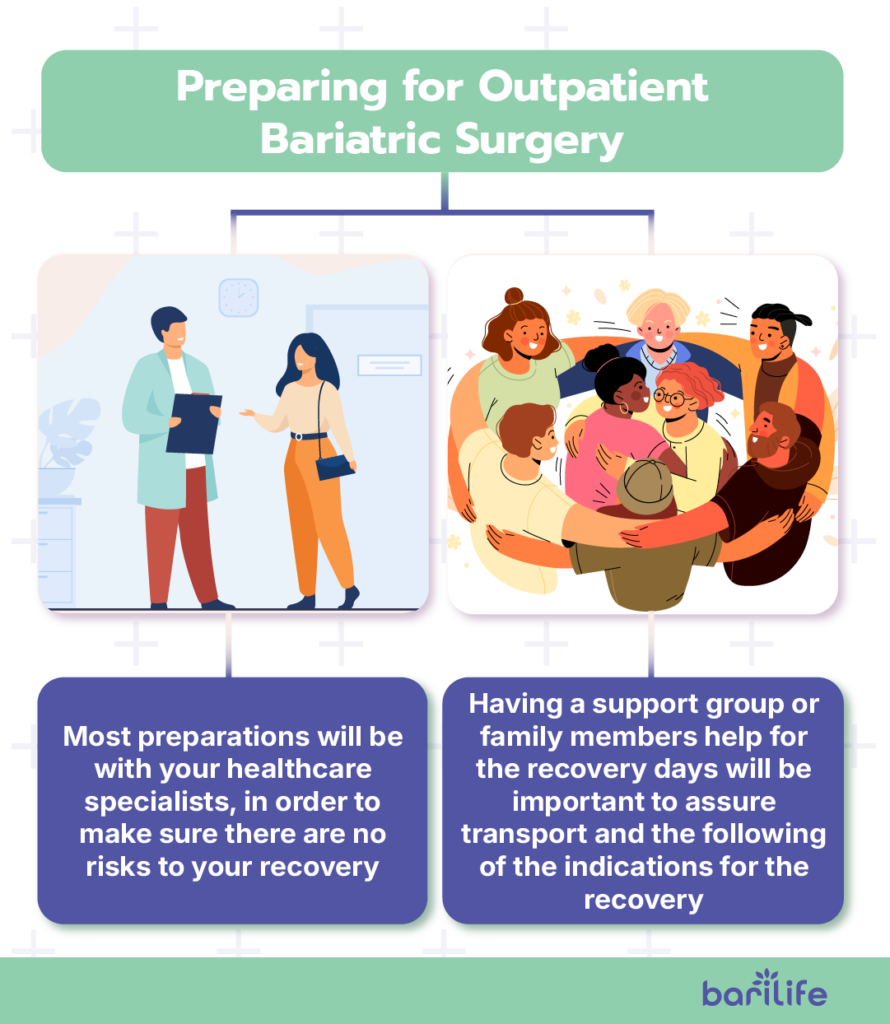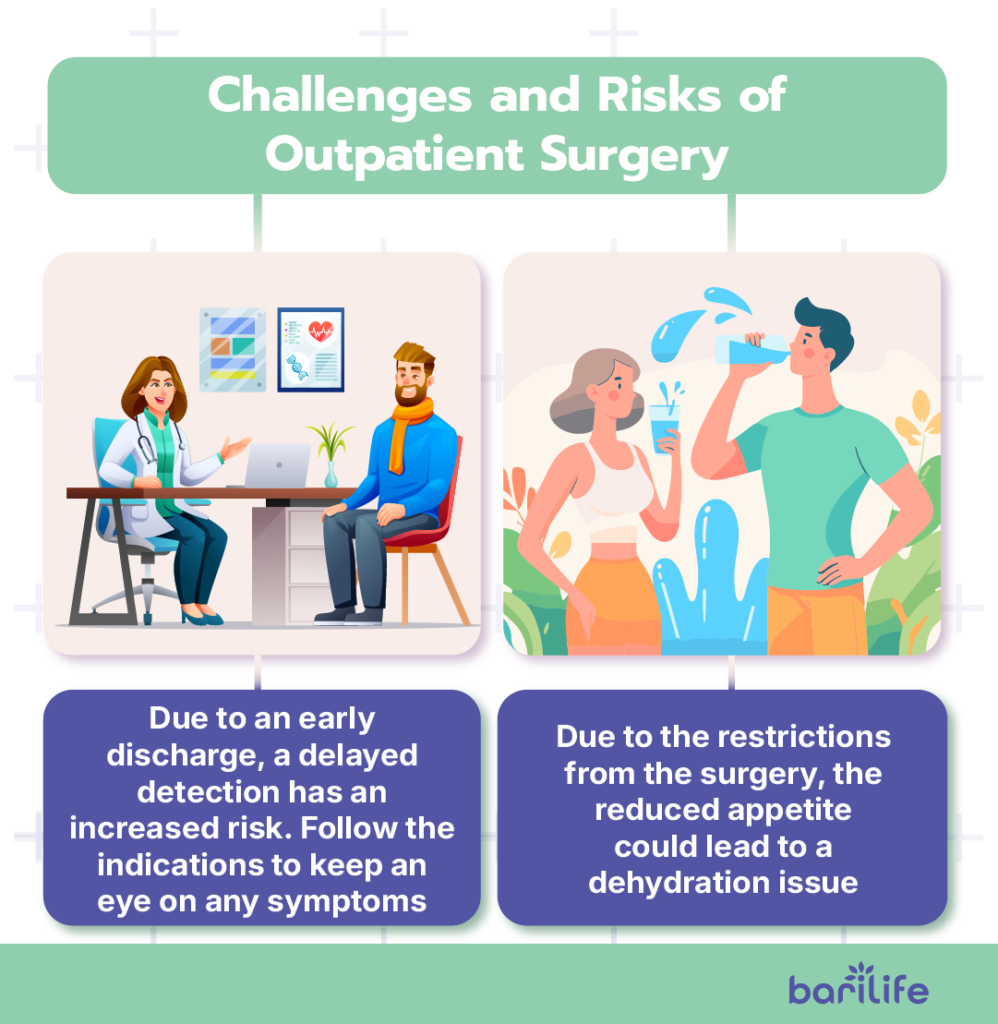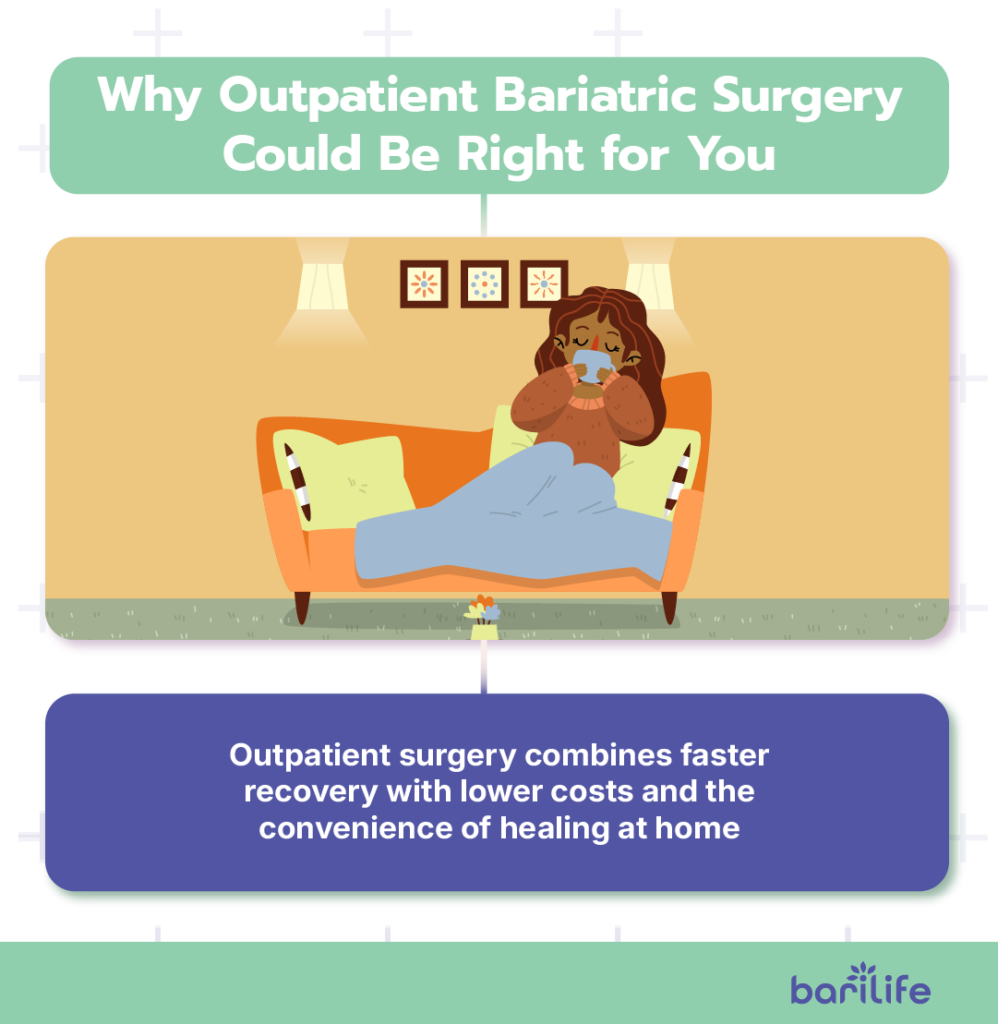Key Takeaways
- Outpatient bariatric procedures provide a less invasive and more convenient option for weight management.
- Proper preparation and post-op care are crucial for success, including pre-surgical medical evaluations, lifestyle adjustments, and a well-planned home recovery set up with support from family or caregivers.
- Bari Life provides essential nutritional support for bariatric patients, offering specialized supplements that help maintain proper vitamin and mineral levels for optimal healing and long-term health.
While some bariatric surgeries require an overnight stay in the hospital, thanks to advancements in surgical techniques, many procedures can now be outpatient.
This approach allows you to recover comfortably at home while reducing costs and the risk of hospital-acquired infections.
Understanding whether an outpatient procedure fits your situation is key to making an informed decision.
We’ve created this guide to explain outpatient bariatric surgery. Learn which procedures are outpatient, the benefits of bariatric surgery, who qualifies for them, and how to prepare.
Table of Contents
Understanding Outpatient Bariatric Surgery

Outpatient bariatric surgery has improved weight loss treatment by offering effective procedures that don’t require extended hospital stays. These minimally invasive surgeries aim to reduce infection risks and speed recovery.
Common outpatient procedures include gastric sleeve and adjustable gastric banding. Both are minimally invasive and help achieve long-term weight loss. The gastric sleeve reduces the stomach’s size, while the adjustable band restricts food intake to help manage portions effectively.
New techniques, such as bariatric endoscopy, are also becoming more common. For example, the intragastric balloon involves inserting a saline-filled balloon into the stomach to help patients feel full with less food. Unlike traditional methods, these procedures are minimally invasive and require no surgical incisions, making them an attractive option for outpatient solutions.
Patient Selection Criteria
Several key factors influence whether outpatient bariatric surgery is right for you. Physical health, mental readiness, and a strong support system are crucial for maintaining safety and achieving success.
Key Factors for Eligibility:
- Body mass index (BMI): Patients with a BMI of 35 or higher, especially those with obesity-related conditions like diabetes or hypertension, are often eligible.
- Health conditions: Overall health must support surgery, with evaluations for heart health, lung function, and other key factors.
- Lifestyle readiness: Dedication to necessary lifestyle changes, including diet and exercise, is essential for long term effects of bariatric surgery.
- Psychological assessment: Mental health evaluations identify potential barriers such as eating disorders or unmanaged stress.
- Support systems: It is vital to have a reliable network of friends and family to help with recovery at home and provide emotional encouragement.
These healthcare evaluations can help determine whether outpatient bariatric surgery is right for your weight loss journey and align it with your personal goals.
Preparing for Outpatient Bariatric Surgery
Undergoing outpatient bariatric surgery requires careful preparation to ensure a smooth procedure, minimize risks, and promote a successful recovery. Unlike traditional inpatient surgeries, outpatient procedures mean you return home the same day, making preparation even more critical.

Preparation Checklist:
- Medical evaluations: Complete necessary tests such as blood work, imaging, and cardiac assessments to confirm readiness for surgery.
- Nutritional counseling: Work with a dietitian to understand dietary requirements before and after surgery. A pre-surgery liquid diet may be necessary to reduce surgical risks. This includes incorporating bariatric protein shakes, and liquid bariatric vitamin for optimal nourishment.
- Psychological readiness: Take part in mental health evaluations to manage challenges like emotional eating or stress management.
- Lifestyle modifications: Adopt healthier habits, including quitting smoking, reducing alcohol, and engaging in regular physical activity.
- Medication adjustments: Consult with your healthcare provider about necessary medication changes, including stopping blood thinners or certain diabetes medications before surgery.
Practical Tips:
- Transportation and support: Arrange for a responsible adult to drive you home and stay with you for the first 24 hours post-surgery.
- Preoperative instructions: Follow your surgeon’s fasting guidelines and medication instructions to prevent complications.
- Home recovery setup: Prepare a comfortable recovery area with essentials such as extra pillows, loose-fitting clothing, pre-portioned soft foods, and easy access to water.
- Work and daily life adjustments: Plan for time off work and arrange help with household tasks to allow for adequate rest and healing.
Ongoing Support for a Successful Recovery
Education and support groups are invaluable in navigating the post-surgery transition. Regular follow-ups with your bariatric team, including surgeons, dietitians, and mental health professionals, help ensure long-term success.
What to Expect During the Procedure
Knowing how long does bariatric surgery take and what to expect on the day of your outpatient bariatric surgery can help ease anxiety and ensure a smooth experience.
Check-In and Preoperative Preparation
- Arrival and registration: Arrive at the surgical facility at your scheduled time. Bring your ID, insurance information, and any required paperwork.
- Pre-surgery prep: You’ll change into a hospital gown, and a nurse will place an IV for fluids and medications. Your vital signs will be monitored, and your surgical team will review your medical history one last time.

- Anesthesia consultation: The anesthesiologist will discuss the anesthesia plan, answer questions, and administer medication to help you relax before surgery.
During the Procedure
- Anesthesia administration: You’ll receive general anesthesia, meaning you’ll be completely asleep and won’t feel any pain during the procedure.
- Minimally invasive surgery: Most outpatient bariatric surgeries, such as gastric sleeve or gastric balloon placement, are performed laparoscopically through small incisions or through the mouth. The procedure typically lasts between 45 minutes to 2 hours, depending on the type of surgery.
- Monitoring and safety: Your surgical team closely monitors your vital signs throughout the operation to ensure safety and optimal results.
Post-Op Recovery in the Facility
- Waking up in recovery: After surgery, you’ll be taken to a recovery area where nurses will monitor your breathing, heart rate, and pain levels as the anesthesia wears off.
- Pain and nausea management: Mild discomfort, nausea, or grogginess is normal. Your medical team will provide medications as needed.
- Walking & hydration: You may be encouraged to sit up and take short walks to reduce the risk of blood clots and aid digestion. You’ll also start sipping small amounts of water.
Getting Ready to Go Home
- Meeting discharge criteria: Before you’re cleared to leave, you must be able to:
- Drink small amounts of fluids without difficulty
- Walk short distances with assistance
- Have stable vital signs and manageable pain levels
- Receiving discharge instructions: Your surgeon will provide detailed post-op care instructions, including:
- Medication guidelines
- Dietary restrictions (starting with clear liquids)
- Signs of complications to watch for
- Follow-up appointment details
- Transportation and supervision: Since anesthesia can cause drowsiness, you’ll need a responsible adult to drive you home and stay with you for at least 24 hours.
Challenges and Risks of Outpatient Surgery
Outpatient bariatric surgery has benefits but also comes with challenges that need careful preparation. Being aware of potential risks and planning ahead can help in managing a smoother recovery.

Potential Complications
Here are some potential complications to watch for.
- Bleeding and infection: These are the most common risks associated with any surgery, including outpatient procedures.
- Delayed detection of issues: Early discharge may delay the detection of complications like bleeding or infections.
- Blood clots: Prolonged immobility after surgery can increase the risk of blood clots, particularly in the legs.
- Anesthesia reactions: Some people may experience adverse reactions to general anesthesia, though this is rare.
- Dehydration: Post-surgery dietary restrictions and reduced appetite can lead to dehydration if not managed properly.
Strategies to Mitigate Risks
Here are some strategies to help reduce the risks of complications.
- Educate yourself on warning signs of complications, such as unusual pain, fever, or swelling.
- Use tools like mobile apps or wearables to monitor your recovery and remind you of follow-up appointments.
- Stay active as recommended to reduce the risk of blood clots.
Financial and Support Considerations
Several other steps to take for a smooth experience.
- Verify your insurance coverage for outpatient bariatric surgery to avoid unexpected expenses.
- Arrange for a caregiver to assist with mobility, meal preparation, and emergency needs during recovery.
Building a support system, such as enlisting family members, hiring a caregiver, or joining a recovery group, can make your recovery smoother. Knowing the risks and having a plan for follow-up care helps you prepare for outpatient bariatric surgery.
Why Outpatient Bariatric Surgery Could Be Right for You
Outpatient bariatric surgery combines faster recovery with lower costs and the convenience of healing at home, making it a practical choice for many people.
For individuals who meet the criteria and are prepared for the responsibilities of outpatient care, this option can be an excellent choice.
Careful preparation and adherence to postoperative care are crucial for a successful outpatient surgery experience.

Working closely with your healthcare provider can help determine if this approach aligns with your needs and health goals. Following their guidance will help you manage recovery effectively and confidently.
How Bari Life Can Help
Proper nutrition is essential for a smooth recovery and long-term success after bariatric outpatient surgery. Bari Life offers a range of supplements designed specifically for the unique needs of bariatric patients.
Their products help bridge nutritional gaps by providing essential vitamins and minerals that may be difficult to obtain through diet alone, especially in the early stages of recovery. This includes bariatric vitamins like bariatric vitamins for hair loss, bariatric probiotic for gut health, and bariatric multivitamin with iron for essential nutrient replenishment.
From complete multivitamin formulas to protein supplements and hydration support, Bari Life makes it easier for patients to meet their post-surgical nutritional requirements.
Visit Bari Life to get the essential nutritional support you need.
Conclusion
Outpatient bariatric surgery offers a safe, effective, and convenient alternative for weight loss treatment, allowing eligible patients to recover at home while reducing costs and hospital-related risks. With advancements in minimally invasive techniques, procedures like gastric sleeve, gastric banding, and bariatric endoscopy have become more accessible in outpatient settings.
However, success depends on proper preparation, including medical evaluations, lifestyle changes, and a strong support system. Patients must carefully follow postoperative care guidelines, stay vigilant about potential complications, and maintain ongoing medical and nutritional support for long-term health.
If you’re considering outpatient bariatric surgery, consulting with your healthcare provider is crucial to determine if it aligns with your health needs and personal goals. By making an informed decision and adhering to the recommended care plan, you can maximize the benefits of the procedure and achieve sustainable weight loss success.
If you want to learn more, why not check out these articles below:
- When Was The First Bariatric Surgery Performed?
- Success Rate of Bariatric Surgery
- How Does Bariatric Surgery Work?
- Can You Have Bariatric Surgery Twice?
References
McCarty T, (2006). Can bariatric surgery be done as an outpatient procedure? Adv Surg.



What are your tips and tricks to post-bariatric success?